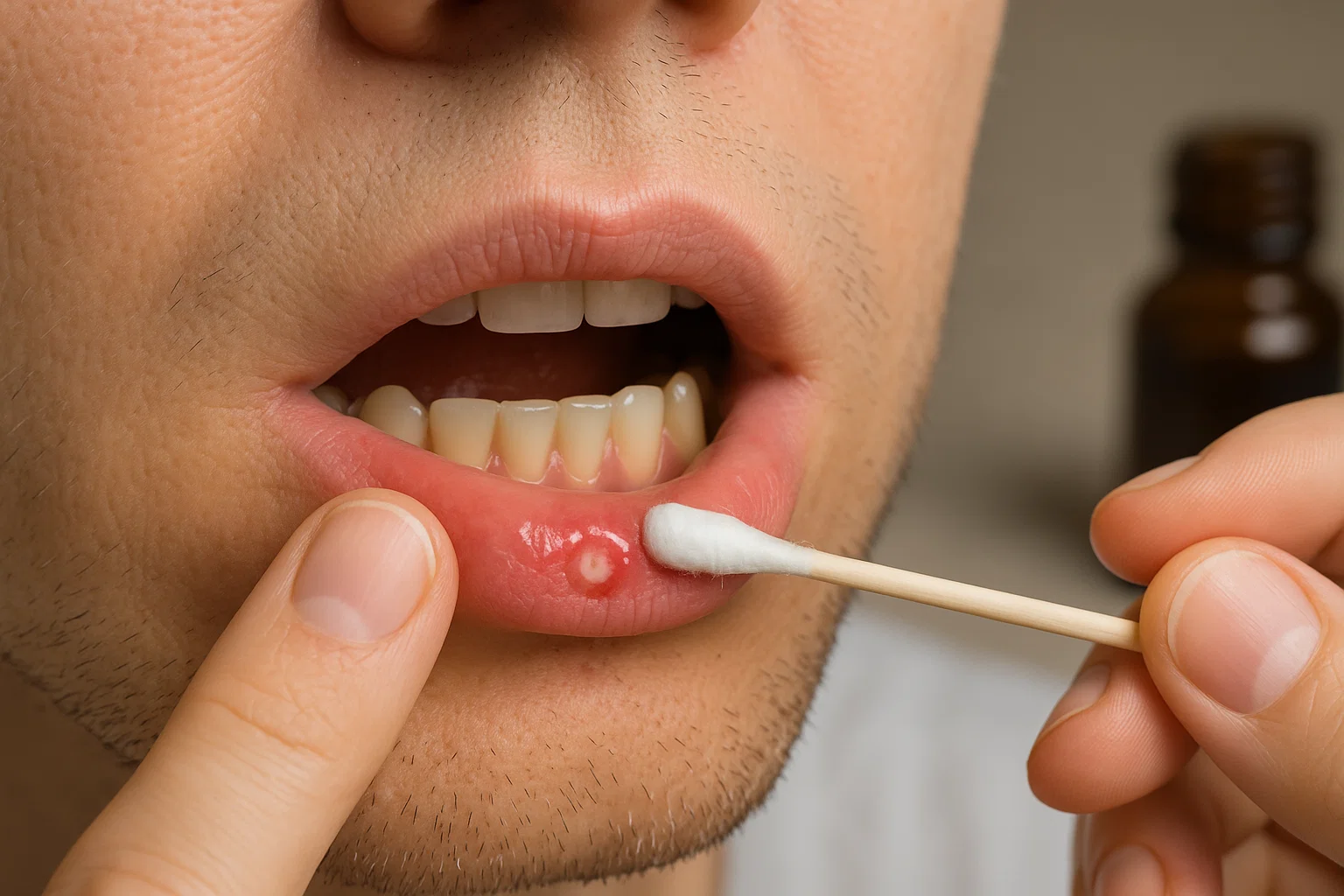Menu
Free Consultation

Aphthous ulcers, commonly known as canker sores, are small, painful lesions that form inside the mouth. While they are not contagious, they can significantly affect a person’s quality of life by interfering with speaking, eating, and drinking. This comprehensive blog explores aphthous ulcer treatments, including causes, symptoms, medications, home remedies, and prevention strategies. We’ll also answer key questions like “What is aphthous ulceration?”, “What causes aphthous ulcers?”, and more.
An aphthous ulcer is a round or oval-shaped sore that develops on the non-keratinized mucosa of the mouth, such as:
These ulcers typically have a white or yellow center with a red inflamed border. Aphthous ulcers are a common form of recurrent oral ulceration and are usually not associated with viral infections.
Aphthous ulceration refers to the recurring or chronic appearance of these non-infectious ulcers inside the mouth. It is one of the most common oral mucosal conditions affecting both adults and children.
Understanding the types of aphthous ulcers is crucial for choosing the appropriate treatment.
| Type | Size | Healing Time | Scarring | Frequency |
|---|---|---|---|---|
| Minor | < 1 cm | 7–14 days | ❌ No | Most common |
| Major | > 1 cm | Weeks | ✅ Yes | Less common |
| Herpetiform | Clusters | 7–10 days | ❌ Rare | Rare, but painful |
Although the exact cause is unclear, several triggers are known to contribute to the development of aphthous ulcers.
Questions Addressed:
Mild ulcers can often be treated with OTC products. These include:
For more severe or recurrent aphthous ulcers, doctors may prescribe:
Home care can play a significant role in soothing pain and accelerating healing:
Frequent or severe aphthous ulcers may be a symptom of an underlying autoimmune or systemic condition. If your ulcers occur more than 4–5 times per year or are accompanied by other symptoms (e.g., fatigue, eye inflammation, or joint pain), consult your doctor.
Potential related conditions:
Aphthous ulcers are thought to be an immune-mediated condition. In individuals with a hypersensitive immune response, the body may mistakenly attack the mucous membranes inside the mouth, leading to ulceration.
Some people have a genetic predisposition to this overactive response, making them more susceptible to recurrent ulcers—especially during times of stress or illness.
Though less commonly discussed, some studies and patient reports suggest that environmental factors may contribute to ulcer flare-ups. These may include:
Interestingly, aphthous ulcers are reported to occur less frequently in smokers. While this does not suggest smoking as a treatment, it highlights a curious immunologic response to tobacco-related keratinization of oral tissues.
After smoking cessation, some individuals report an initial increase in ulcer outbreaks before normalization.
For those who suffer from frequent and painful ulcers, the condition may also lead to psychological effects such as:
| Type | Healing Duration | Notes |
| Minor Ulcer | 7–14 days | Most common, heals without scarring |
| Major Ulcer | 2–6 weeks | May require corticosteroids |
| Herpetiform | 10–14 days | Often mistaken for viral infections |
There is growing evidence that genetics play a significant role in the occurrence of aphthous ulcers. Studies have shown that individuals with a family history of recurrent mouth ulcers are significantly more likely to experience them as well.
If both parents have a history of aphthous ulceration, the likelihood in children increases substantially.
Common toothpaste ingredients like sodium lauryl sulfate (SLS) can cause or worsen ulcers in sensitive individuals. Switching to SLS-free toothpaste and alcohol-free mouthwashes can significantly reduce the frequency of outbreaks.
Additionally, soft-bristled toothbrushes and gentle brushing techniques help prevent trauma-induced lesions.
Current research is exploring:
As our understanding grows, future aphthous ulcer treatments may become more personalized and effective.
Although prevention is not always possible, especially for genetically predisposed individuals, the following strategies help reduce outbreaks:
You should consult a healthcare provider if:
Children are also prone to aphthous ulcers, especially during periods of stress, poor oral hygiene, or dietary imbalance.
It’s essential to differentiate aphthous ulcers from other mouth lesions:
| Condition | Cause | Location | Contagious | Appearance |
| Aphthous Ulcers | Non-viral, immune | Inside mouth | ❌ No | White/yellow sore with red edge |
| Cold Sores | Herpes simplex virus | Lips, outer mouth | ✅ Yes | Fluid-filled blisters |
| Oral Thrush | Fungal (Candida) | Tongue, cheeks | Mildly | White, creamy patches |
It is a small, non-infectious ulcer that appears inside the mouth, often painful but not contagious.
It refers to the condition of having recurrent aphthous ulcers or canker sores.
Causes include stress, nutritional deficiencies, trauma, food sensitivities, and sometimes systemic disease.
Mild cases respond well to topical OTC products and home remedies. Severe or recurrent cases may require prescription medications.
No. Unlike cold sores, aphthous ulcers are not caused by a virus and cannot be transmitted.
Aphthous ulcers, while uncomfortable, are manageable with the right care and awareness. Understanding their triggers and knowing how to treat and prevent them can lead to faster healing and fewer recurrences. From OTC aphthous ulcer treatment to prescription medication and natural remedies, there are effective options for every severity level.
If you experience frequent or severe episodes, consult a healthcare professional to rule out underlying conditions and receive personalized treatment.
